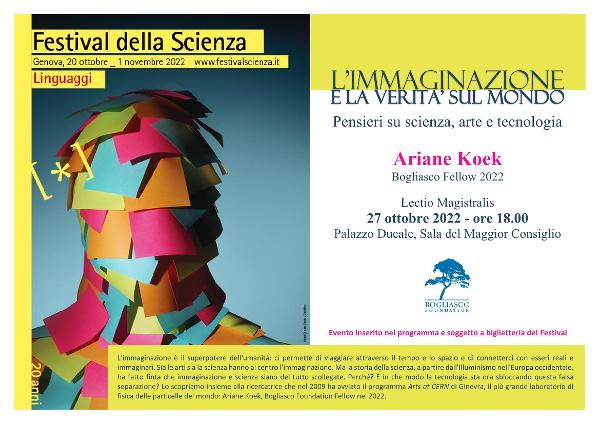Festival della Scienza

Festival della Scienza, Genova
Lectio Magistralis con Ariane Koek
27 ottobre 2022 – ore 18.00
Palazzo Ducale, Sala del Maggior Consiglio
L'immaginazione e la verità del mondo
Pensieri su scienza, arte e tecnologia
In Sei proposte per il nuovo millennio, Italo Calvino parlava del potere dell'immaginazione nel rivelare la verità del mondo. È il superpotere dell'umanità, che ci permette di viaggiare attraverso il tempo e lo spazio per connetterci con esseri reali e immaginari. È anche un veicolo supremo per l'empatia e la comprensione e, secondo alcuni, può essere una forza per il cambiamento e il bene morale nel mondo. Sia le arti che la scienza hanno al centro l'immaginazione, senza la quale non oseremmo esplorare oltre i parametri conosciuti. Ma la storia della scienza, a partire dall'Illuminismo in Europa occidentale, ha fatto finta che l'immaginazione non esista nella scienza. Perché? Perché le arti sono state storicamente considerate l'unica sede dell'immaginazione? E in che modo la tecnologia sta ora sbloccando questa falsa separazione? Scopriamo la risposta a queste e molte altre domande attraverso gli occhi della ricercatrice che ha avviato, progettato e diretto il programma Arts at CERN di Ginevra, presso il più grande laboratorio di fisica delle particelle del mondo.
Imagination and the Truth of the World
Thoughts on art, science and technology
The Italian writer Italo Calvino in “Six Memos for the New Millennium” spoke about the power of the imagination to reveal the Truth of the World. It is humanity’s super power: enabling us to travel across time and space to connect with beings that exist and don’t exist. It is also a supreme vehicle for empathy and understanding, and according to some can be a force for change and moral good in the world.
Both the arts and science have imagination at their heart - without it we wouldn’t dare to explore beyond known parameters. But the history of science since the Enlightenment in Western Europe has pretended that imagination does not exist in science. Why is this? Why have the arts been historically looked at as the sole home for the imagination? And how is technology - which is the appliance of science - now unlocking this false separation?
This illustrated talk will explore these questions and many more through the eyes of 2022 Bogliasco Foundation Fellow Ariane Koek, who founded the Arts at CERN programme in 2009 at the world’s largest particle physics laboratory outside Geneva. She initiated, designed and directed the programme until 2015, and since leaving has been involved in many international arts, science and technology initiatives, exhibitions and publications.
Date: October 27, 2022
Time: 6:00 PM